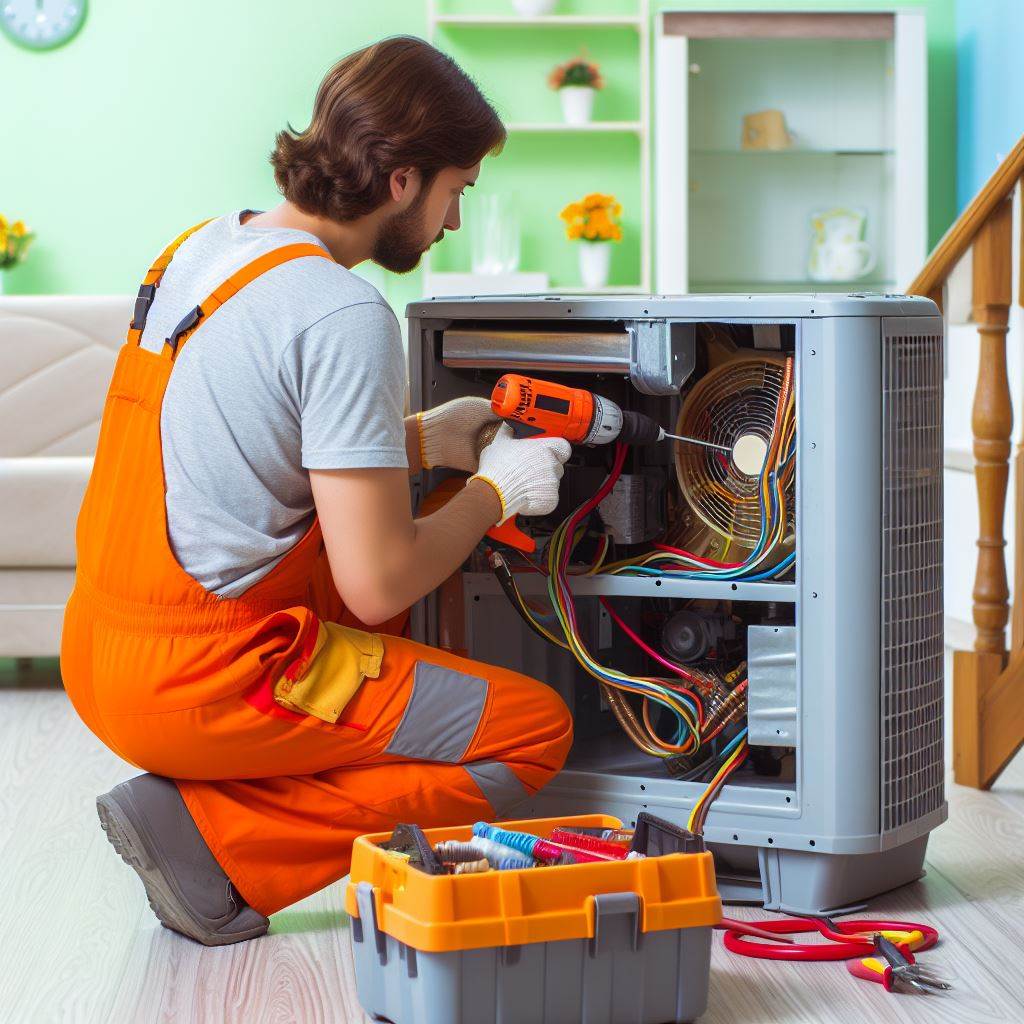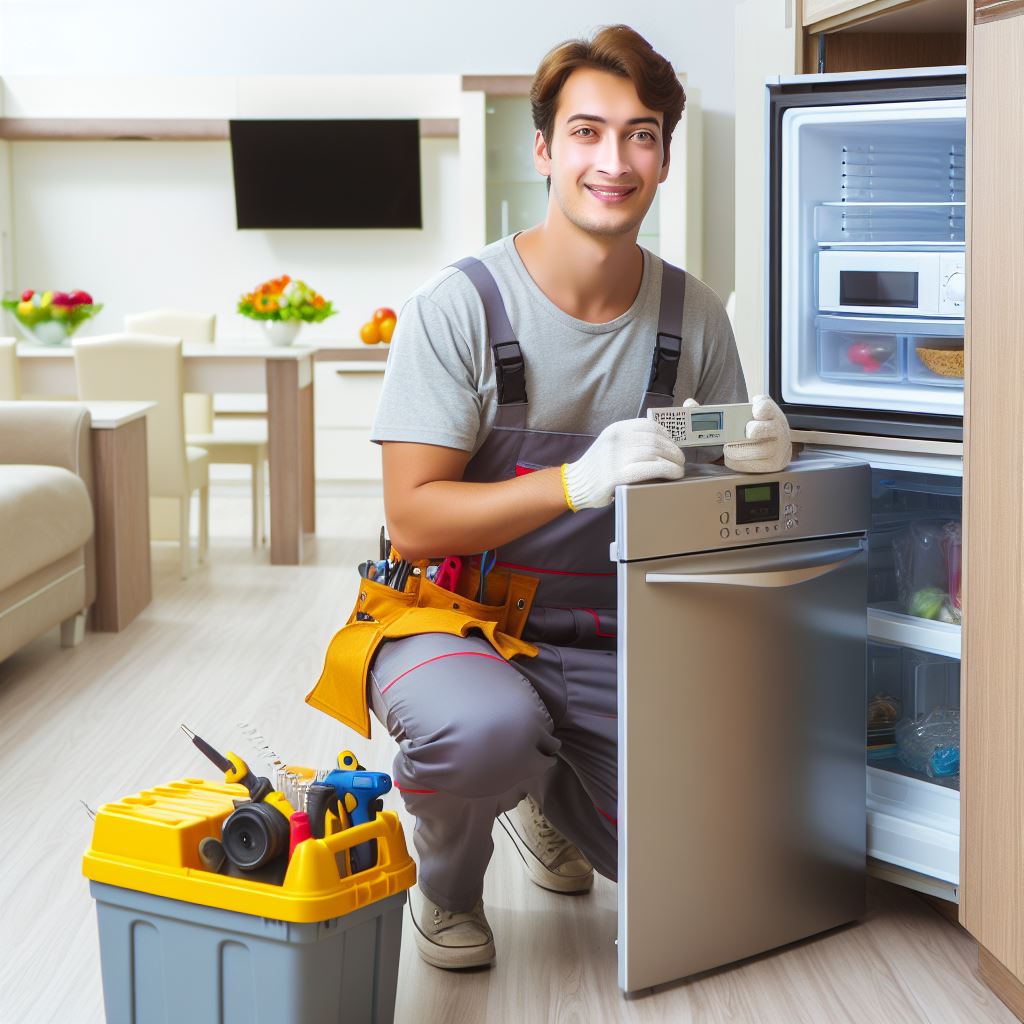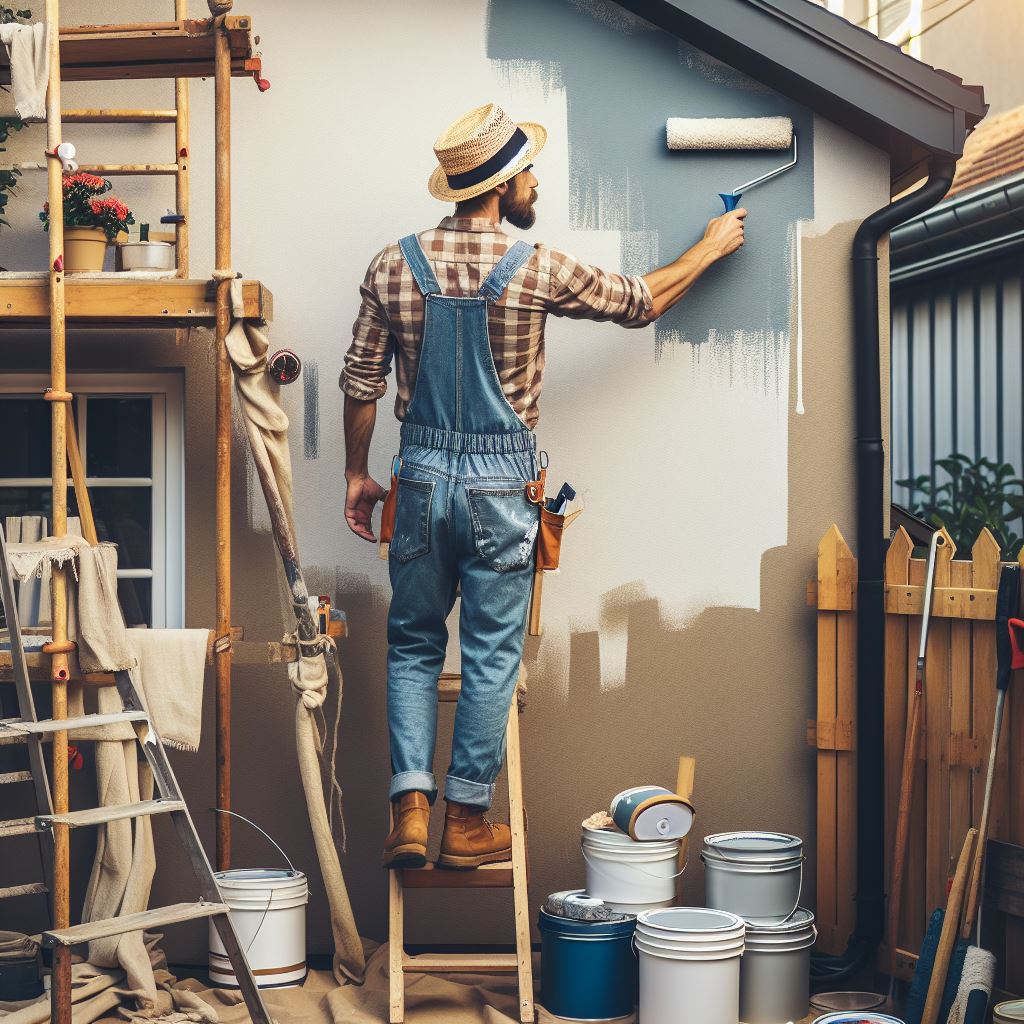Introduction
HVAC maintenance plays a vital role in rental properties, as it ensures proper ventilation, heating, and cooling.
Regular service and upkeep help landlords avoid expensive repairs in the long run.
Moreover, a well-maintained HVAC system can significantly contribute to keeping tenants happy and healthy.
When tenants feel comfortable in their living spaces, they are more likely to stay longer, reducing turnover rates for landlords.
Tenant retention has numerous benefits, such as stable rental income and reduced costs associated with finding new tenants.
Furthermore, a properly functioning HVAC system ensures that tenants consistently enjoy a comfortable environment, regardless of the weather outside.
This not only enhances their well-being but also helps prevent health issues caused by extreme temperatures or poor air quality.
Happy and healthy tenants are more likely to maintain their rental units in good condition, saving landlords from excessive repair costs.
In addition to the financial advantages, maintaining a healthy and comfortable living environment contributes to a positive reputation among tenants.
Word-of-mouth advertising is a powerful tool in attracting new tenants, and positive feedback from current tenants can significantly impact the success of rental properties.
In essence, proper HVAC maintenance is crucial for rental properties, as it ensures the well-being of tenants and offers various benefits for landlords.
From reducing turnover rates to maintaining a good reputation, prioritizing tenant comfort and health is key to a successful rental business.
The role of HVAC systems in tenant well-being
HVAC systems play a crucial role in maintaining the well-being of tenants within a building.
They go beyond just providing temperature control and also have a significant impact on indoor air quality and humidity management.
Let’s explore each of these aspects further:
Providing comfortable temperatures
One of the primary functions of an HVAC system is to ensure comfortable temperatures throughout the year.
Whether it’s hot summer months or chilly winters, a well-maintained HVAC system can regulate the indoor temperature and create a pleasant environment for tenants.
By efficiently distributing cool or warm air, the HVAC system helps tenants avoid extreme temperatures that can negatively impact their well-being.
It ensures that the temperature within the building remains consistent and comfortable, regardless of the weather conditions outside.
HVAC maintenance plays a vital role in ensuring optimal temperature control.
Regular inspections and servicing of the system can help identify and fix any issues that may affect its ability to maintain comfortable temperatures.
This, in turn, contributes to tenant satisfaction and overall well-being.
Ensuring indoor air quality
Indoor air quality has a significant impact on the health and well-being of the occupants in a building.
Poor air quality can lead to respiratory problems, allergies, and other health issues. HVAC systems play a crucial role in maintaining good indoor air quality.
These systems have filters that help trap dust, allergens, and other pollutants present in the air.
Regular maintenance and filter replacements ensure that these systems continue to effectively purify the air, providing tenants with clean and healthy indoor air.
Additionally, HVAC systems also help with proper ventilation, ensuring the circulation of fresh air within the building.
This prevents the buildup of indoor pollutants and keeps the air fresh and oxygenated.
It promotes a healthier living environment for tenants and contributes to their overall well-being.
Managing humidity levels
Humidity levels within a building can greatly impact the comfort and health of its occupants.
High humidity can lead to a damp and muggy environment, promoting mold growth and increasing the risk of respiratory issues.
On the other hand, low humidity can cause dryness, discomfort, and potential respiratory problems.
HVAC systems are equipped with features to manage humidity levels effectively.
They can regulate and maintain optimal humidity levels within the building, ensuring the comfort and well-being of tenants.
By controlling humidity, HVAC systems help prevent the growth of mold, mildew, and other harmful microorganisms.
They also help in reducing dust mite populations, which can trigger allergies and respiratory problems.
Overall, proper humidity management enhances tenant health and contributes to a happy and comfortable living environment.
In fact, HVAC systems play a crucial role in maintaining tenant well-being within a building.
They provide comfortable temperatures, ensure indoor air quality, and manage humidity levels.
Regular maintenance and efficient operation of these systems are essential to keep tenants happy and healthy.
Read: Roof and Gutter Care: Tips for Property Longevity
Regular maintenance tasks for HVAC systems
A well-functioning HVAC system is essential for keeping tenants comfortable and healthy.
Regular maintenance tasks play a crucial role in ensuring the system operates efficiently and reliably.
Here are five important tasks that should be performed regularly:
Changing air filters regularly
Regularly changing air filters is one of the most critical maintenance tasks for HVAC systems.
Dirty filters restrict airflow and reduce the system’s efficiency, leading to higher energy consumption and increased wear and tear.
It is recommended to change filters every 1-3 months or as specified by the manufacturer.
Cleaning HVAC system components
Dust, dirt, and debris can accumulate in various parts of the HVAC system, including coils, fans, and vents.
Regular cleaning of these components not only improves indoor air quality but also enhances the system’s performance.
Clearing any obstructions and ensuring proper airflow is vital for maintaining optimum efficiency.
Inspecting and repairing ductwork
The ductwork plays a significant role in distributing heated or cooled air throughout the building.
Over time, leaks, cracks, or loose connections can develop in the ducts, leading to air loss, inefficient operation, and poor indoor air quality.
Regular inspection and prompt repair of any issues are necessary to optimize air distribution and minimize energy wastage.
Checking refrigerant levels and system pressure
Refrigerant is a crucial component of HVAC systems that enables efficient cooling.
Low refrigerant levels or improper system pressure can lead to inadequate cooling capacity, decreased efficiency, and even system breakdowns.
Regularly checking and maintaining proper refrigerant levels and system pressure is essential for optimal performance and longevity.
Testing and calibrating thermostats
Accurate temperature control is essential for ensuring tenant comfort and energy efficiency.
Regularly testing and calibrating thermostats can help identify any discrepancies and ensure they are functioning correctly.
Properly calibrated thermostats help maintain consistent temperatures, prevent unnecessary HVAC use, and minimize energy wastage.
By performing these regular maintenance tasks, property owners can ensure their HVAC systems operate efficiently and reliably, ultimately keeping tenants happy and healthy.
Additionally, regular maintenance helps prolong the lifespan of HVAC equipment, reducing the likelihood of expensive repairs or premature replacements.
It is always recommended to hire professional HVAC technicians for inspections and maintenance to ensure thorough and accurate servicing.
Read: Tech-Driven Tenant Screening Methods
Scheduling routine HVAC maintenance
Creating a maintenance schedule
- Assess the HVAC system and identify the recommended maintenance tasks.
- Determine the frequency at which each maintenance task should be performed.
- Create a detailed schedule that includes dates and specific tasks for each maintenance visit.
- Consider factors such as the age of the system and the tenant’s usage patterns when creating the schedule.
- Ensure that the schedule allows for regular inspections and preventive maintenance to avoid major problems.
Hiring professional technicians
- Research and identify reputable HVAC service providers in your area.
- Read reviews and check their certifications and licenses to ensure they are qualified.
- Request quotes and compare the prices and services offered by different technicians.
- Hire technicians who have experience working with residential HVAC systems and are well-equipped.
- Schedule the maintenance visits with the selected technicians according to the created schedule.
Communicating with tenants about maintenance visits
- Notify tenants in advance about the scheduled maintenance visits through email or written notice.
- Clearly explain the purpose of the visit and how it benefits their comfort and health.
- Provide specific dates and times, allowing tenants to plan accordingly.
- Encourage tenants to communicate any specific issues or concerns they may have regarding the HVAC system.
- Remind tenants of any necessary preparations they should make before the technicians arrive, such as clearing the area around the HVAC unit.
- Ensure that tenants understand the importance of allowing technicians access to their units during the scheduled visits.
By following these steps in scheduling routine HVAC maintenance, landlords can effectively maintain the system and keep tenants happy and healthy.
A well-maintained HVAC system ensures proper air quality and temperature control, creating a comfortable living environment.
Regular inspections and preventive maintenance can also help identify and address potential issues before they become major problems, saving both time and money in the long run.
Read: Property Management Software: A Deep Dive

Tenant Education on HVAC Use and Maintenance
Providing Guidelines in the Lease Agreement
- Include detailed HVAC guidelines in the lease agreement to set expectations from the beginning.
- Clearly explain thermostat settings, filter replacements, and routine maintenance responsibilities.
- Make sure tenants understand the importance of proper HVAC use to ensure their comfort and health.
Educating Tenants on Proper Thermostat Settings
- Teach tenants how to use their thermostat efficiently for optimal comfort and energy savings.
- Explain the different settings and temperature adjustments based on the season.
- Encourage tenants to use programmable thermostats and set appropriate temperatures when they’re away.
Promoting Regular Maintenance Habits
- Emphasize the significance of regular HVAC maintenance to tenants for the longevity of the system.
- Provide a maintenance schedule and reminders for filter changes, coil cleaning, and system inspections.
- Educate tenants on the importance of professional yearly tune-ups to identify potential problems early on.
Addressing Common HVAC-Related Tenant Concerns
- Establish open communication channels for tenants to report HVAC issues promptly.
- Respond promptly to concerns and provide necessary information on troubleshooting common problems.
- Offer guidance for tenant-friendly troubleshooting, such as checking circuit breakers and thermostat batteries.
- Arrange regular HVAC inspections to identify and address any potential problems before they become major issues.
- Provide recommendations for reputable HVAC contractors in case tenants need professional assistance.
- Conduct regular educational sessions or newsletters to keep tenants informed about HVAC best practices.
- Respond promptly to tenant inquiries regarding energy efficiency, allergies, ventilation, or any other HVAC-related concerns.
- Offer information on the benefits of proper insulation, air sealing, and utilizing natural ventilation whenever possible.
- Address the importance of maintaining a clean and dust-free environment to reduce strain on the HVAC system.
- Encourage tenants to report any unusual odors, noises, or temperature inconsistencies for immediate investigation.
- Share information on the potential health hazards of neglecting HVAC maintenance, such as mold or poor indoor air quality.
- Highlight the financial benefits of energy-efficient HVAC practices, including lower utility bills and a reduced carbon footprint.
By incorporating comprehensive HVAC guidelines into lease agreements and educating tenants, property owners can ensure a happier and healthier living environment.
Tenant education plays a crucial role in maximizing HVAC system efficiency, reducing unnecessary repairs, and promoting overall tenant satisfaction.
Read: Automated Maintenance Requests: A How-To
The advantages of proactive HVAC maintenance
A well-maintained HVAC system not only keeps tenants happy and healthy, but it also offers several benefits for both property owners and managers.
Proactive HVAC maintenance goes beyond reactive repairs and helps to prevent breakdowns, extend equipment lifespan, improve energy efficiency, and enhance tenant retention and satisfaction.
Reducing the risk of breakdowns and costly repairs
Regular HVAC maintenance allows technicians to identify and address minor issues before they turn into major breakdowns.
By conducting routine inspections, cleaning, and tune-ups, potential problems can be nipped in the bud, reducing the likelihood of system failures.
This proactive approach saves both time and money by avoiding costly emergency repairs.
Extending the lifespan of HVAC equipment
Just like any mechanical system, HVAC equipment has a finite lifespan.
However, regular maintenance can significantly extend the life expectancy of this expensive and essential equipment.
Through regular cleaning, lubrication, and parts replacement, HVAC systems can operate at their optimal efficiency, reducing wear and tear and preserving their longevity.
Improving energy efficiency and reducing utility costs
An efficiently running HVAC system not only keeps tenants comfortable but also helps property owners save on energy costs.
Regular maintenance ensures that the system operates at peak efficiency, reducing wasteful energy consumption.
Technicians can optimize settings, replace filters, clean fans and coils, and identify any inefficiencies that may be causing excessive energy usage.
Enhancing tenant retention and satisfaction
Happy and satisfied tenants are more likely to renew their lease and recommend the property to others.
A well-maintained HVAC system plays a significant role in tenant comfort and overall satisfaction.
With proactive maintenance, property owners and managers can ensure that tenants are consistently provided with clean air, reliable heating, and cooling, thus improving their overall experience.
In general, proactive HVAC maintenance offers multiple advantages for property owners, managers, and tenants.
By reducing the risk of breakdowns and costly repairs, extending equipment lifespan, improving energy efficiency, and enhancing tenant retention and satisfaction, a well-maintained HVAC system becomes an asset to any property.
Conclusion
Recap: HVAC Maintenance Matters
- Regular HVAC care ensures tenant comfort, energy efficiency, and indoor air quality.
- Prevents costly breakdowns and extends the system’s lifespan.
- Boosts property value and tenant satisfaction.
Priority for Property Owners
- Prioritizing Routine HVAC Maintenance: Encourage property owners to schedule regular HVAC check-ups. Proactive care prevents major issues.
- Highlighting Cost Savings: Regular maintenance reduces long-term costs. It’s an investment in efficiency, saving money on repairs.
- Improved Performance: Well-maintained HVAC systems perform optimally. Tenants enjoy consistent comfort, fostering satisfaction and loyalty.
- Enhanced Property Value: A well-maintained property holds higher value. It attracts quality tenants and reflects positively on the landlord’s investment.
- Positive Tenant-Landlord Relationship: Proactive care builds trust. Happy tenants are likely to renew leases, ensuring a stable and positive landlord-tenant relationship.
Urging property owners to prioritize routine HVAC maintenance yields multifaceted benefits—cost savings, improved performance, enhanced property value, and positive tenant relations.
Final Thoughts: Long-Term Benefits
- Proactive HVAC maintenance is an investment in tenant well-being and property longevity.
- Saves money by preventing major repairs and minimizing energy consumption.
- Ultimately, prioritizing HVAC care creates a happy, healthy, and thriving living environment.




